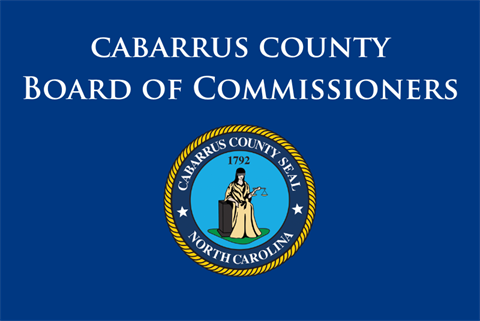Cabarrus commissioners adopt Fiscal Year 2024-25 budget
Published on June 17, 2024

The Cabarrus County Board of Commissioners voted Monday (June 17) to adopt the Fiscal Year 2024-25 (FY25) budget, which takes effect on July 1.
The plan sets the tax rate at 57.6 cents per $100 of assessed value.
With that, owners of a $356,350 house (the median single-family assessed home value in Cabarrus as of the 2024 revaluation) would pay $2,052.76 a year in County property tax.
The approved plan calls for $200,000 in surplus funds generated from the adopted tax rate be allocated to establish a revolving loan fund for affordable housing assistance. The fund will be administered by the Revolving Fund Council in cooperation with WeBuild Concord. Also, County staff will identify an additional $1.8 million in funds not expected to be used during FY25, bringing the total affordable housing fund to $2 million.
The original Recommended Budget presented to commissioners in May called for a tax rate of 60 cents per $100 of value, which would have generated a surplus of $15 million over a two-year period (FY25 and FY26). That funding would in turn be used to cover a projected budget shortfall in FY27 and FY28.
That surplus was removed from the final FY25 approved budget.
The approved budget ordinance consists of the General Fund ($379.9 million), the Community Investment Fund ($74.2 million), the Landfill Fund ($2.45 million), the 911 Emergency Telephone Fund ($473,775), the Fire Tax District Fund ($9.55 million), the Social Services Fund ($450,000), the Intergovernmental Fund ($2.6 million), the Workers Compensation and Liability Fund ($4.9 million), the Health and Dental Insurance Fund ($19.54 million) and the Opioid Settlement Fund ($670,866).
Residents can visit https://engage.cabarruscounty.us/budget2025 to learn more about the County’s budget process, read a FAQ and stay updated on future budget communications.
The FY25 budget focuses on maintaining services for residents and investing in public safety. Here are some highlights:
Prioritizing public safety and enhancing social services
The largest new expense in the FY25 budget—significant increases to public safety salaries— was approved unanimously by commissioners in March 2024. These increases recognize the contributions of Sheriff’s Office, EMS, Fire Services and Emergency Management professionals and improve recruitment and retention.
The FY25 budget also funds:
- Eight new positions for EMS to place a 14th ambulance into service. This additional ambulance will provide 24-hour coverage, improve response times and reduce the need for standby coverage
- A new truck and armored van for the Sheriff’s Office Special Response Team to enhance incident response capabilities
- A Simulation Technical Specialist and a Logistics Specialist for EMS to enhance in-house training and to manage distribution of medical supplies, equipment and other items
- One additional Deputy Sheriff to provide security at the Concord Library branch
While position needs exist across departments, the Department of Social Services (DSS) continues to experience significant turnover and must remain compliant with State and Federal guidelines. Failure to do so can result in significant financial penalties or even takeover by the State of a program or the entire department.
Ten new positions are included for DSS, including:
- Three Eligibility Specialist II and an FNS Eligibility Supervisor II in Food and Nutrition Services
- A Licensing Social Worker III, Quality Assurance Evaluator and Community Social Services Technician in Child Welfare
- An Intake Social Worker II in Adult and Family Services
- An Administrative Specialist I in Child Support Enforcement
- An Administrative Specialist III within DSS Administration
Addressing education and capital needs
Overall, the Cabarrus County Schools (CCS) operating budget increases to $90.2 million – $8.5 million over FY24. Kannapolis City Schools (KCS) operating budget increases to just under $10.5 million – up 1.16 million from FY24. Additional funding for both CCS and KCS covers increased costs for personnel, including salaries, certified supplements and benefits. The funding also covers inflation- and enrollment-related cost increases for instructional, staff training, building maintenance, utilities and technology.
For Rowan-Cabarrus Community College (RCCC), additional funding for salary and benefit increases and utilities are included, resulting in total funding of $4.6 million, an increase of 6.2% from FY24.
As part of the prior-year FY24 budget, the Board approved new financing for 13 projects totaling an estimated $180 million. Projects included the public safety training facility, relocation of DSS and several education projects. Given market conditions, the debt issuance was delayed until FY25 to address changing needs.
The budget request submitted by Cabarrus County Schools “was the largest in recent memory,” according to Cabarrus County Manager Mike Downs. Totaling $1 billion, it addresses projected enrollment growth over the next decade.
To meet the 10-year request, an additional $170 million is allocated for CCS to construct two elementary schools to open in August 2026.
An additional $54 million is allocated to RCCC for construction of a Workforce Innovation Center and for substantial renovations to Building S201.
The balance of the additional funding goes towards closing gaps for approved projects, including the $20 million shortfall for the Regional Behavioral Health Center. The County received $32.5 million from the State for the project, but the overall budget to deliver the full scope of the project is currently $55 million.
In addition to debt-financed projects, the budget allocates $27.6 million of cash reserves to meet other capital needs for CCS, KCS, RCCC and the County.
The FY24 budget runs from July 1, 2024 through June 30, 2025.
The County hosted multiple budget-specific Government 101 public events earlier this year. Officials gathered at locations around the county to provide an overview of the budget and revaluation processes and answer questions.
In February, the board held its two-day retreat to officially kick off the budget season. They have also held two workshops. A budget public hearing was held during June 3 Work Session.